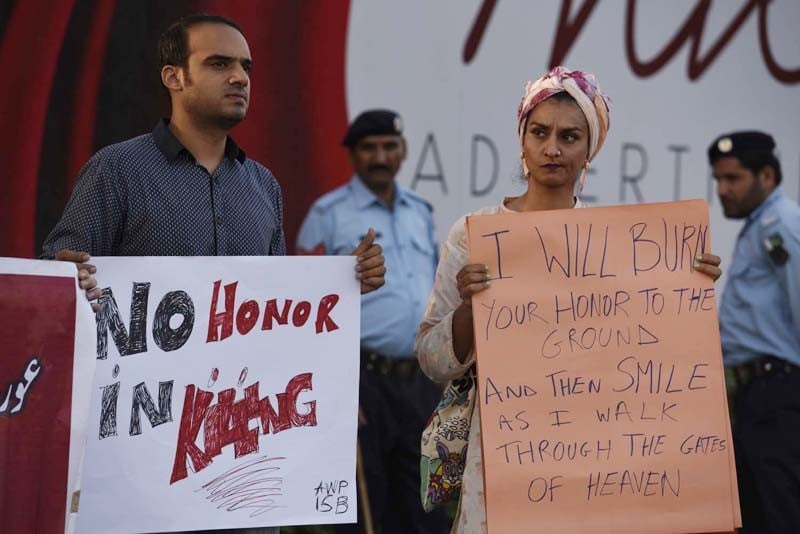
Did Qandeel’s disagreement with the dominant culture warrant her murder?

For many, it is the question of who killed her. I believe the question is what killed her? For many, she deserved the fate of being murdered. For others, she did not. It is in these two competing worldviews that the question of what killed Qandeel Baloch lies. Qandeel’s wilful murder is just a high profile case of otherwise occasional happenings of killing in the name of so-called honour across Pakistan.
For her brother, it was for the sake of Baloch honour that he murdered Qandeel. Nevertheless, killing in the name of restoring honour goes far beyond the confines of ethnicity and is equally shared by other ethnic groups from all across Pakistan. In fact, there is no monolithic culture, characteristic of a particular ethnicity. Every ethnicity has a culture, which has crosscurrents to its mainstream. Thus, if a particular person acts in the name of a particular ethnicity, it should not suggest that all members of a given ethnic group will act in a similar fashion.
Culture is not static. Some cultures are more dynamic than others, however. A culture is not uniform either. We have diverse sub-cultures within an overarching dominant culture. In the context of present article, dominant culture is the one which majority of people ascribe to. This culture justifies the killing of Qandeel in the name of honour. Within the same culture, a myriad set of sub-variant cultures either acquiesces to honour killing or at least condones it. For the majority, which subscribes to the overarching culture, Qandeel’s ‘provocative’ videos warranted her murder.
Unfortunately, in a deadly conservative society like ours, you normally do not have the privilege to decide your own choice. You have to give in to the overarching culture more often than not!
If we put the vast majority of subscribers to the dominant culture into the shoes of Qandeel’s brother, they will probably act in a strikingly similar fashion the way Qandeel’s murderer did. Here is the rub: the society we live in is the main hurdle to our individualistic self. An individual is seen through the prism of his or her family, clan and tribe and ethnicity. Especially a female is considered to be the honour of a family. When her reputation is at stake, the honour of whole family is at risk. The surrounding society taunts the families when a girl elopes with a boy or something else of the sort happens. People use profane language, engage in slander and as a result, it becomes too unbearable for the families to withstand the shame.
When violators of the so-called established norms are caught, they are killed. Only then honour is considered to be restored honourably. No different was Qandeel’s case. Her actions were an affront to family’s honour, at least her brother believed so.
What is noteworthy to mention is that every adherent of the dominant culture does not believe in killing in the name of honour. In Pakistan, from February 2014 to February 2016, a total of 1276 people were killed in the name of honour killing.
In opposition to the ascendant culture is its peripheral counterpart, which challenges Qandeel’s so-called honour killing. From this perspective, we might have disagreed with what Qandeel used to do or what she stood for. That was our choice. Did her disagreement with our choice warrant her murder? Of course not for the subscribers of the nonconformist rival culture who believe that each one of us lives a life of his/her own. They have typical laissez-faire attitude towards fellow human beings and believe that no one should dictate others. Identifying where the militant overarching culture takes its roots is important, in order to effect a positive change in the culture.
Religion is a very important ingredient of culture. In our case, it appears to be the most important component on various occasions. Honour killing is not an exception. Nevertheless, it is not Islam per se that enshrines honour killing but men’s interpretation, deeply rooted in patriarchy, of the religion that either espouses killing in the name of honour or at least condones it. Seen this way, the cultural rules are unambiguously made by men.
In fact, Islam has varied cultural streams. No single, uniform interpretation of Islam informs the Muslim world. The religion is congenial to reinterpretation through Ijtihad, which implies solutions to ever-coming human problems within the light of the Holy Quran and Sunnah of the Prophet (PBUH). The fact that Islam allows for reinterpretation of religion makes it conducive to accepting modernity. However, the problem is that the dominant clergy of Sunni-Deobandi persuasion is averse to ijtihad. Secondly, no two clergymen are open to each other’s interpretation. What are our options then?
There is an ever-increasing need to slowly and gradually separate politics from religion with state having absolute monopoly on the legitimate use of coercive means. In this context, state as a complainant in Qandeel Baloch’s murder case is a welcome step. This has barred the Baloch family to pardon her killer. The same should be the state attitude in every wilful murder case.